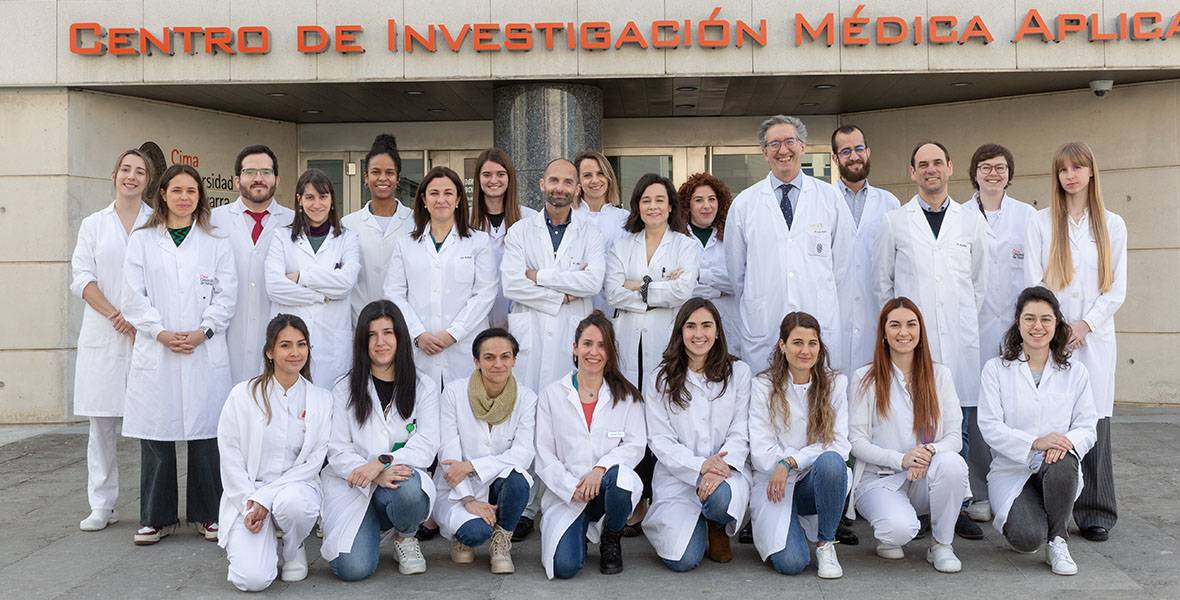A calculator identifies a group of cancer patients with a favorable prognosis
This method, developed by the Cima in collaboration with the Spanish Myeloma Group (GEM-PETHEMA)may help individualizing the treatment of patients with multiple myeloma and primary systemic amyloidosis

Behind: Judith Martínez, Camila Guerrero, Luis Esteban Tamariz, Esperanza Martín, Andreina Taveras, Leyre Burgos, Bruno Paiva, Aintzane Zabaleta, Paula Rodríguez Otero, Rosalinda Termini, Jesús San Miguel, Juan José Garcés, Diego Alignani, Carmen González and Anastasia Herasymenko.
May 3, 2023
Researchers from Cima and Clinica University of Navarra have developed a calculator that identifies patients with multiple myeloma and light-chain amyloidosis with a better prognosis because they have a more benign profile. This tool, designed in collaboration with the Spanish Myeloma Group (GEM-PETHEMA), could become part of the diagnostic workup of these patients.
Multiple myeloma is the second most common hematological cancer. It is a very heterogeneous blood type, so patients have very different clinical behavior and response to treatment. "Using flow cytometry we have identified a subgroup of patients, both symptomatic and asymptomatic, with a profile similar to that seen in subjects with benign myeloma precursor disease, called monoclonal gammopathy of uncertain significance (MGUS). Likewise, we have also found this subgroup of patients in another related hematologic disease, light-chain amyloidosis," explains Dr. Bruno Paiva, co-director of the Hemato-Oncology Program at Cima, a program integrated into the Cancer Center Clínica Universidad de Navarra, and director of the study.
The group have developed an open access online tool that allows hematologists worldwide to classify patients using routine flow cytometry data. Flow cytometry discriminates residual normal plasma cells and tumor cells with high accuracy. "Thanks to the big data generated over more than ten years by GEM-PETHEMA, particularly at the Cancer Center Clínica Universidad de Navarra, the Hospital Universitario de Salamanca, and the Hospital 12 de Octubre in Madrid, we have developed this calculator, which identifies patients with a benign profile (GMSI) in real-time and predicts their survival according to different clinical-biological characteristics," says Dr. Paiva. The results of this research, validated in international series of patients from the United States, the Czech Republic, and Italy, have been published in the Journal of Clinical Oncology, the scientific journal with the highest impact in Oncology.
Clinical application
This tool is helpful for asymptomatic patients and those with active multiple myeloma. The Cima researcher explains, "In the case of asymptomatic individuals, even if they have other risk factors, this subgroup has a very low probability of progression. In fact, after comparing with other patients previously treated developing symptoms, we have seen no changes in the evolution of the disease".
Meanwhile, 80% of patients in the subgroup with active multiple myeloma and a benign profile show progression-free rates five years after intensive autologus transplant. "Moreover, surprisingly, stopping treatment does not increase the risk of progression, even in those patients who had not achieved complete remission," notes Dr. Paiva. Therefore, this calculator could help identify patients in whom a partial response to treatment should not be considered suboptimal "and should not be overtreated because of that."
The investigators also confirmed the efficacy of this tool in a group of patients with primary systemic amyloidosis, a very rare hematological malignancy with low survival rates. "Our calculator results from more than a decade of cooperative work in Spain and collaboration with other international centers. We are now making it available to the scientific community to improve the management of patients with multiple myeloma and light-chain amyloidosis in the routine clinical practice," concludes Dr. Paiva.
This research is part of the Navarra Health Research Institute (IdiSNA), the Cancer Center (CIBERONC), and the Spanish Myeloma Group. In addition, it has public and private funding, such as Iberdrola, through the Spanish Association Against Cancer, within its call for "Accelerator Grants" (EDITOR Project).